- Home
- J. -H. Rosny aîné
Helgvor of the Blue River Page 5
Helgvor of the Blue River Read online
Page 5
“It is a tiger, a lion, a gray bear—or the Tzohs!” Helgvor stated, adjusting his bow. Glava clutched her club, preferring to leave her spear to the warrior.
Then Helgvor and Hiolg, with their ears pressed against the soil, heard distinct, soft steps which were unmistakable to them.
“The Tzohs are coming!”
Even Amhao understood the gesture, and Hiolg started to laugh at her fears, for he believed Helgvor invincible. Although less confident than the boy, Glava was elated at the thought of fighting at the warrior’s side. The steps halted, and the nomad guessed that the enemy had paused on the fringe of the clearing and that the enclosure was being examined with great care. The same silence prevailed on both sides, the same prudence, as of felines in ambush.
The nearest tree was within arrow-shot, and all about the enclosure there was nothing but grass and a few bushes too thin and scattered to protect a man. For a while, the stillness was so complete that Helgvor might have believed he had been mistaken, had the attitude of his beasts allowed uncertainty. Identical rage stiffened their muscles and dilated their pupils.
Since he had identified human steps, the Ougmar did not permit them to roam outside, and, accustomed to ambush, they waited, at once patient and eager. The four fugitives were watching, each one at a loophole, and Amhao showed herself as alert as the others. At length Hiolg, who faced west, came to touch Helgvor’s shoulder.
“A Tzoh in the trees!”
Helgvor turned gently, reaching out for his bow. A Tzoh was climbing an ash-tree, screened by the branches of a large sycamore. The fellow, having risen halfway up the trunk, could see into the enclosure. At that distance, no Tzoh bow could have reached him with an arrow, but the tall Ougmars had weapons that carried very far, and Helgvor had the mightiest one in the clan.
His eyes fastened on the climber, the nomad waited until the left shoulder and part of the torso showed; he tightened the string, released a missile. He meant to hit the chest, but the distance was too great; despite his calculations, the arrow only pierced the hand of the climbing man.
With a cry of rage, the Tzoh slid down along the bole, striking the ground heavily, while his comrades, knowing they had been discovered, roared frantically. The resounding voice of the Ougmar launched the war-cry, and because silence had become useless, Hiolg and Glava also shouted, while the dogs barked furiously and the wolf howled as on hunger nights.
“The Tzohs are vultures lacking courage! They shall perish under the hatchet, the spear and the arrow!”
“The Tzohs took the women from the Men of the Blue River,” the chief of the enemy jeered. “The Men of the Blue River are stupid as sheep and slugs.”
The clamors died out after leaving the mouths of the criers, and silence settled down again, weighted with anxiety. Helgvor was wondering if the warriors of the second canoe had joined those of the first. The voices he had heard revealed five or six men, but that might have been prearranged, some of the new arrivals might have purposely remained quiet.
The red furnace of the Sun seemed to devour the western forest, then the clouds, the hue of flowers and fire, created a universe wider than that of the forests, the lakes, the plains and the rivers. That limitless life was dying out with every quiver of the leaves; the strange ashes of darkness were spreading the murderous night.
It was the hour when weak animals know that meat-eaters are leaving their dens.
Formidable voices exchanged menaces. The lion roared, wolves howled, and the jackals added their sharp yelps to the sinister laughter of the hyena. When there remained no light save the weak glow of the stars, the aspect of the clearing became awe-inspiring.
In the granite enclosure, human beings and animals found their night-senses growing keener, while the Tzohs discerned the shelter of the Ougmars and the women only as a shadowy mass. All was still, the quiet of ambush.
The wild beasts were prowling. The Tzohs wished to surprise the tall nomad. They had scouted the obstacle, and knew where the spears and stones would come from, but an attack might be made in vain against those sheltered behind the protecting boulders.
Kamr with the bull’s chest said: “If the Tzohs are to attack, why wait? Will not the man of the Blue River and his animals be ready for combat all night long? And Kzahm, our chief, is waiting for us on the island.”
“How attack?” a warrior, whose face was seamed with deep scars, asked.
“Night is dark. The Tzohs shall crawl through the grass, and when Kamr gives the war-cry, we shall leap in all together.”
“That’s well,” the other admitted. “But the bow of the River Man must be dreaded.”
“The River Man cannot aim on a moonless night! Are five Tzohs afraid of a lone Ougmar?”
“Woum is not scared,” proudly replied the one with the scars.
And the five men started the crawl. Half of the space which they must cross was thick with high grass and ferns, which concealed them from human eyes. But the nostrils of the wolf and dogs did not fail. From them, Helgvor knew that the Tzohs were approaching. But when he pressed his ear against the sod, the sounds made by roaming animals outside prevented discerning the progress of the enemy.
With a flint stone he lit an armful of dried grass in a hollow of the soil, and made torches from two branches. A strong glow lit the enclosure and cast some light into the clearing.
“When the Tzohs rise in the short grass,” he addressed the boy, “Hiolg shall raise the torches so that Helgvor can see the enemy.”
In their intense excitement, the dogs were pushing their pointed muzzles through the gaps; the wolf growled deeply. Almost simultaneously Hiolg, Helgvor and Glava perceived movements in the shorter grass. The boy picked up the torches and, standing on a boulder, illuminated the clearing. The quivering rays revealed the presence of the Tzohs. Helgvor bent his bow, discharged two arrows swiftly. One scratched a foe’s shoulder, the second sank beneath the collar bone. The man dropped the club grasped in his right fist and uttered a great cry. Helgvor now had but two arrows left.
Startled by the torchlight and the skill of the tall nomad, the Tzohs hugged the ground to became invisible. The torches cast an oscillating radiance which made surprise out of the question. The enclosure must be besieged or stormed. Having engaged himself in the venture, already responsible for the wounding of two men, in the grip of mad fury and intense hatred against Kzahm whose scorn he feared, Kamr resolved to risk everything.
“The Tzohs will leap ahead,” he ordered, “and kill the River Man.”
“Two Tzohs have been wounded here, two were wounded in Houa’s canoe,” retorted the scarred man.
“Have the Tzohs forgotten vengeance?” Kamr snarled. “Do Tzohs tremble like storks before an eagle? If the River Man does not perish with the two women who have betrayed the clans, the Tzohs must go home trembling, and the Ougmars’ women will laugh in their faces! The River Man is alone. I shall slay him with blows of my club!”
This was not too boastful. All knew that Kamr had attacked leopards with his hatchet, and on a day of great hunting he had slain a lion.
“While Kamr attacks the River Man, the warriors shall beat down the women and the beasts.”
Kamr uttered the war-cry, and the four men bounded forward through the grass. An arrow hummed, struck the ground, then a second scratched the arm of a warrior without weakening him. Tzohs reached the enclosure and scaled it rapidly with the vigor of strong young men.
Helgvor held his spears, and Glava made ready to help him. Almost at the same moment, the warriors appeared on the crest of the rocks. Hiolg had quickly put out the fire and extinguished the torches. There remained only the light of the stars, and in the violet night, silhouettes were indistinct as vapors.
Plans were forgotten. Helgvor swung a club, Glava used a spear, and Hiolg threw stones. An assailant collapsed under the rain of blows, another was pierced through the shoulder by Glava’s weapon, but despite his injury, he leaped down into the enclosure followed by Kamr a
nd the remaining warrior. The dogs leaped; Glava fought desperately.
Hiolg was helping the wolf which had caught a warrior at the neck from behind. Frightened at first, Amhao darted forward to take her share of the struggle.
Kamr and Helgvor were face to face.
They were powerful fighting machines, equal in bulk, energy and courage, unlike in build. With his cubical head, his chest rounded as the chests of animals, Kamr represented the race of the Tzohs, sprung from volcanic soil, while Helgvor, with his long skull, his broad, flat chest, his long limbs, was the perfect descendant of the people who lived by the Green Lakes and the Blue River. The hatred of their ancestors flamed in them, they were animated by obscure legends, ancestral memories and incompatible instincts.
The clubs whirled. In that corner of the enclosure, where they had much space to move in, Kamr insulted Helgvor and his ancestors, while the Ougmar predicted the vengeance of his tribe. Each held a spear in the left hand. In the semi-darkness, Helgvor was lighter than Kamr, whose head melted into the night.
Kamr thrust with his spear, but Helgvor broke the weapon with a swing of his club. Then the club of Kamr fell like a stone. The heavy weapons clashed together, and Helgvor staggered. With a long howl, the Tzoh tried to complete his victory, but the tip of Helgvor’s spear menaced his breast and Kamr prudently leaped to safety.
The spear, barely visible in the darkness, struck his shoulder, but did not sink beneath the skin. For a very brief moment they caught their breath, face to face, waiting for an opportunity. Near them, in the obscurity wolf, dogs, the women and the boy were fighting the other Tzohs.
Then Kamr resumed the attack, and again the clubs clashed with such mighty impact that they whirled from the men’s fists.
“The River Man shall die!” Kamr growled.
He leaped forward, clasped Helgvor in his arms. Among the Tzohs, Kamr was admitted to be the strongest in a fight without weapons, where body and limbs clash. Even Kzahm, the Black Boar, so formidable with hatchet and club, would have been beaten. So Kamr was confident, and when he had grasped the Ougmar around the body, he panted with joy and lifted his foe off the ground.
Helgvor gripped Kamr by the throat. As they fell, then rolled over and over on the ground, Kamr had the advantage at first, having secured the better hold. But his breath grew short, his mouth gaped to inhale. His nerves weakened so that the Ougmar was able to throw aside the heavy body, and Kamr gurgled, flat on his back, the cartilage of his neck broken, smashed by the nomad’s powerful fingers.
After a few quivers, the enormous body became motionless in a last spasm.
“Thus shall die the Tzohs, ravishers of women!” Helgvor cried.
Picking up the club, he ran to assist the women.
Amhao was down, struck by a bronze hatchet and a spear. Glava and the wolf had slain a man, but the girl, bloody and battered, was about to give way before the onslaught of the remaining Tzoh, who had just stunned Hiolg.
The Ougmar leaped like a leopard.
It was not a fight. Twice the heavy weapon fell, and the last Tzoh dropped. The tall nomad shouted his victory to the gleaming stars.
VIII. Pain and Death
Helgvor relit the fire.
In the glare of the purple flames, he saw the blood flow on the face, the arms and the chest of Glava. Amhao seemed dead, pierced by deep wounds. Hiolg, stunned with a club, was beginning to regain consciousness. One of the dogs was dying. The other licked his wounds, while the wolf shook himself in an attempt to rid his flank of a protruding spear.
A grim sadness overcame Helgvor. He alone was strong, for without him, women, children and animals would have died. Yet he himself had been saved by their courage. The nomad left the enclosure to pluck the leaves and the bitter-tasting plants which Ougmars crushed to cover wounds. When he returned, he noticed that Hiolg’s head, although swollen near the temple, was not bleeding. Life was coming back into the boy’s eyes.
Having crushed the leaves and grasses, Helgvor applied them as he had seen done by those who knew ancestral secrets. Then he carried the bodies of the Tzohs and the carcass of the dog outside the enclosure, to avoid the annoyance of wild beasts attracted by freshly spilled blood. He saw the dead man left in the clearing, but he saw no trace of the man whose hand he had pierced with an arrow.
His fatigue was extreme. He looked at Amhao, who was motionless, at Glava, not much better off, at Hiolg, who stirred. Only the wolf and the dog could have resumed the fight.
“Helgvor shall watch until midnight,” he murmured. “Then it will be Hiolg’s turn.”
Squatting near the fire, he listened to the sounds of the forest, haunted by furtive lives. At intervals there could be heard call and menace, cries of alliance, cries of murder, the voices of victory and despair, agonized plaints. Already the prowlers were crawling toward the fresh prey, still bleeding, which even the large beasts would not scorn.
The rising Moon, half-disk of burnished copper which paled as it rose, covered the clearing with uncertain light. The peaceful smells of vegetables passed in the light night-wind. A bat hovered on its membraned wings, fell to the ferns, then two hyenas appeared, their dirty gray pelts streaked with brown. Odd beasts, with blazing eyes, with backs sloping sharply from head to tail, luck had served them well, for their sense of smell was poor.
With sinister chuckles, they smelled the too fresh corpses, and their formidable jaws, powerful as those of lions or tigers, ripped bellies open. Rovers with subtle scent, eyes aglow, slinking forth lightly, the jackals came, light as cats, ears pointed. Here was prey in abundance, eternal hunger increased their avidity, but already five wolves emerged from the night, rough guests which growled threateningly. Then came a wildcat, sliding through the grass, and a screech-owl swooped silently.
When the wolves growled, the hyenas started. Bitter and mournful, the jackals yelped. Hatred and hunger stiffened their spines. Eyes gleamed, teeth glittered in the red maws, an identical instinct for life and death stirred in the timid jackals, in the cowardly hyenas, in the wise wolves.
The jackals were aware of their weakness, and even in numbers did not dare fight. The hyenas knew their jaws could crunch the wolves’ bones. The wolves, alert and angry, estimated the prey; when they saw that there was a share for them, they howled louder to indicate their determination, and took two of the corpses. The jackals surrounded the body farthest from the rest. The hyenas, possessing Kamr, another warrior and the dead dog, understood that a truce had come about, and resumed eating.
Suddenly, twigs crackled, and a rough, thick body crushed small trees. The animal coming forward, supple and heavy at the same time in his gray fur, with his flat skull and enormous claws, disturbed the meal. All knew his might and his brutal temper.
At the sight of the gathering he halted, swayed on his massive paws, his tiny eyes gleaming through coarse hair. Then he stated his will with an imperious grunt. All stopped eating and stared at the intruder. Even those who had never encountered him before understood the menace. He was larger than a tiger, and yielded to none save the mammoth and the rhinoceros.
The wolves being nearer than the hyenas, he drove them away. With long howls, quivering with rage, indignation and hatred, they left. The bear laid one paw on a corpse. The wolves, slinking back, dragged the other away. Bending over his prey, the huge beast paid no attention to them; a cheek and a shoulder had been devoured, but the meat was fresh, oozing blood, and it would not have been otherwise had the bear made the kill himself. Satisfied, he set to work. His fangs sank into a thigh. He felt a sweet pleasure in sating a violent hunger.
While he was tearing strips of flesh, the forest sent forth a new prowler, the formidable odor of which had been scented by wolves and jackals for some time.
The head appeared first, compact, with two streaks of orange hair and great yellowish eyes which palpitated like enormous stars. The feline yawned, and revealed a crimson cavern in which the fangs stood out like long, white daggers. He roared and sw
elled his broad chest, his flanks streaked with somber marking, worked his sharp claws on the ground. All knew him at once, save the gray bear, who came from the mountain, and all were in the grip of terror.
If the gray bear did not know him, he did not know the gray bear. He knew only a brown bear which never dared face him. He was startled to see this one, with the ease of a victor, continue to eat his prey. It happened that if beasts, with the exception of mammoth and rhinoceros, avoided the tiger, in his home mountain, the gray bear acknowledged no rival.
The tiger roared a second time. As the bear was nearest to him, the bear must give up his place. Fury had come, the insane rage that distends the breast.
The bear understood that he was being threatened. He stopped feeding, turned his snout slowly toward the tiger. Before the immense, fiery eyes, his little bloodshot pupils seemed weak, lost in thick hair, pale as glow-worms. But the size of the bear was greater than that of the tiger.
Gathered on his broad paws, swinging his colossal body, the great bear answered the roar with a lordly grunt. He was the descendant of hot-tempered ancestors, and his rage was so swift, so intense, that his breath rustled the grass. Yet the effluvia met before the bodies came into contact, and each one knew dimly that the other was a worthy foe.
Because his breed is prudent, the tiger stalked aside to launch a flank attack. The bear waited no longer, and as the tiger came on, he clawed out, yet he did not stop that hairy mass hurtling like a bolt. Then teeth, claws, and muscles met, and blood dripped through the fur over the short hair. The bear had downed the tiger, but the feline rolled aside, put the larger beast off balance, and they formed a confused whirl of bodies from which rose raucous clamors.

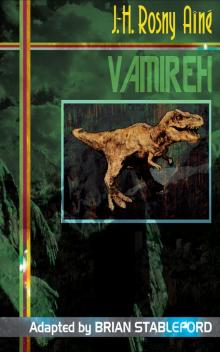 Vamireh
Vamireh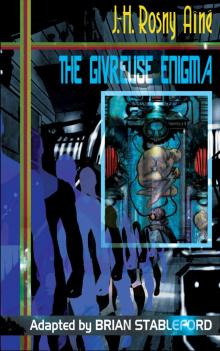 The Givreuse Enigma
The Givreuse Enigma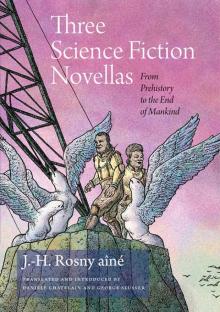 Three Science Fiction Novellas: From Prehistory to the End of Mankind
Three Science Fiction Novellas: From Prehistory to the End of Mankind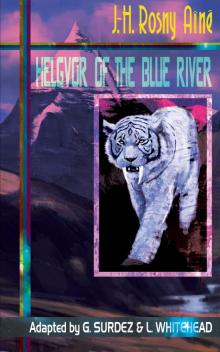 Helgvor of the Blue River
Helgvor of the Blue River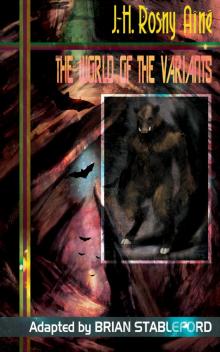 The World of the Variants
The World of the Variants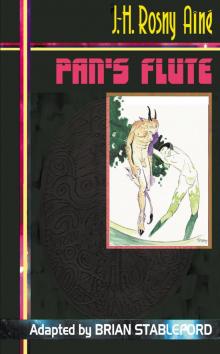 Pan's Flute
Pan's Flute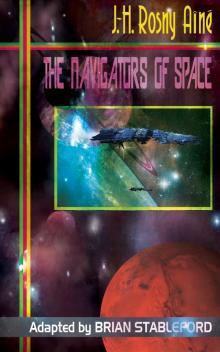 The Navigators of Space
The Navigators of Space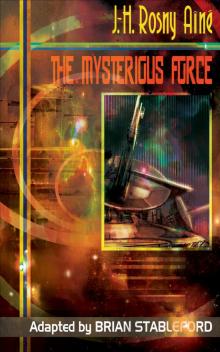 The Mysterious Force
The Mysterious Force